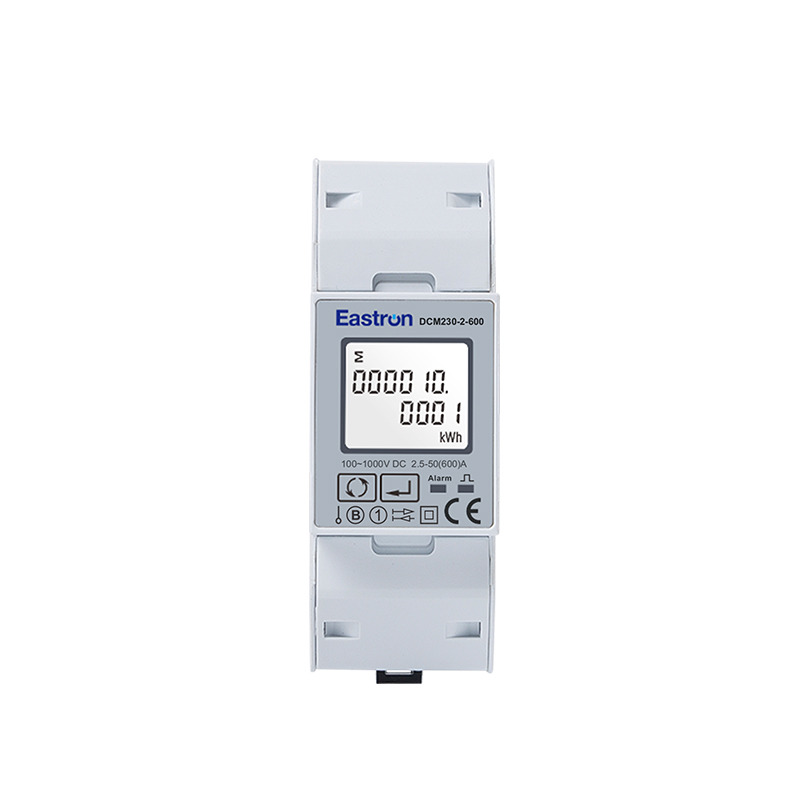Product Consultation
Your email address will not be published. Required fields are marked *
Using a 1000V DC energy meter in large-scale battery storage systems offers several energy efficiency advantages. These benefits primarily stem from the meter's ability to provide accurate real-time data, optimize charging and discharging cycles, and ensure the overall system operates at its highest efficiency. Here are the key energy efficiency advantages:
1. Accurate Monitoring of Energy Flow:
A 1000V DC energy meter provides precise measurements of energy input (during charging) and energy output (during discharging). This allows operators to track the energy flow in and out of the battery storage system, helping to minimize losses and ensure that the system is working at optimal levels.
Accurate energy monitoring is critical in identifying inefficiencies such as overcharging, undercharging, or excessive energy loss that could otherwise go unnoticed.
2. Optimal Charge/Discharge Cycles:
Battery storage systems benefit greatly from optimized charge/discharge cycles to maximize battery lifespan and energy efficiency. A 1000V DC energy meter tracks the voltage and current throughout each cycle, allowing system operators to fine-tune the process and avoid scenarios that could lead to inefficient charging (e.g., charging at the wrong time or overcharging).
By ensuring that the battery operates within the recommended voltage range, the energy meter helps reduce energy waste and prevent capacity degradation over time.
3. Improved Battery Health and Efficiency:
Monitoring voltage and current with a 1000V DC energy meter helps to maintain battery health. It ensures that the battery is neither overcharged nor discharged too deeply, both of which can cause inefficiencies and shorten the battery's usable life. Proper voltage monitoring helps to optimize charging rates and prevent thermal stress that could lead to energy losses during operation.
By keeping the system within optimal operating conditions, the energy meter contributes to better overall efficiency, as it avoids wasteful practices that may occur without precise energy measurement.
4. Energy Loss Detection:
In large-scale systems, energy losses due to wiring issues, inefficiencies in converters, or faults in the battery cells can go undetected without accurate monitoring. A 1000V DC energy meter can help identify abnormalities and losses in the system by tracking the energy output relative to the expected output. This allows operators to quickly address issues like conversion losses (e.g., inverters) or self-discharge in batteries.
Early detection of these inefficiencies helps to minimize energy loss, ensuring that the battery storage system operates more efficiently overall.
5. Enhanced Integration with Renewable Energy Sources:
Large-scale battery systems are often used in conjunction with renewable energy sources like solar or wind power. The 1000V DC energy meter enables seamless integration by accurately monitoring the flow of energy between the battery storage and the renewable energy source. This helps to ensure that energy is stored at the right times and utilized when needed, maximizing the use of available renewable energy.
By optimizing the balance between energy storage and grid export, the energy meter ensures that the system delivers maximum efficiency in both energy consumption and generation.

6. Energy Consumption Optimization:
In systems where the battery storage is part of a larger grid network or a microgrid, the 1000V DC energy meter allows operators to optimize energy consumption by controlling when to discharge the stored energy. For example, if there is a surplus of grid energy or if energy prices are low, the system can be programmed to charge the batteries efficiently. Conversely, during peak energy demand or high prices, the system can be set to discharge stored energy efficiently.
This helps reduce overall grid consumption, lowering energy costs and minimizing the carbon footprint associated with battery usage.
7. Better Performance Analytics and System Optimization:
Many 1000V DC energy meters are integrated with advanced data logging and analytics tools that allow operators to analyze long-term energy trends. By continuously tracking and analyzing energy flow, users can spot patterns and make adjustments to improve system efficiency.
For example, the data collected can be used to adjust charging algorithms, ensuring that the batteries charge during low-demand periods and discharge when energy is most needed. This results in better utilization of the available energy resources.
8. Reduced Downtime and Maintenance Costs:
By providing real-time feedback on system performance, a 1000V DC energy meter helps prevent equipment failure due to inefficient operation or overuse. It can alert users to impending failures in the battery, inverter, or associated components, which helps avoid costly repairs and unexpected downtime.
Regular monitoring and early detection of inefficiencies reduce the need for extensive maintenance, as system components are kept in optimal working condition, thus saving on energy costs and enhancing system longevity.
9. Energy Efficiency in Large-Scale Systems:
In large-scale battery systems, small inefficiencies can accumulate and significantly affect the overall efficiency. A 1000V DC energy meter ensures that each component of the system operates within its most efficient range. By offering real-time monitoring and advanced control over charging and discharging cycles, these meters contribute to improving the overall system efficiency—especially in large-scale installations where even minor energy savings can have a significant impact.
10. Cost Savings and ROI:
By enabling optimized energy use and reducing inefficiencies, a 1000V DC energy meter directly contributes to lower operational costs. Energy savings achieved through more precise control over energy flow, battery performance, and charging cycles result in better financial returns. This is particularly important for large-scale battery systems used in commercial or industrial settings, where efficiency gains can translate into significant cost savings and improved ROI.
Your email address will not be published. Required fields are marked *
We develop and produce high performance electricity meters, power analyzers, current sensors, communication modules and management systems. China Custom Smart Meters Manufacturers and Factory
Eastron China (HQ) : NO 52, Dongjin Road, Nanhu, Jiaxing, Zhejiang, China
Eastron UK : Suite 1 Cornwallis House, Howard Chase, Basildon, UK
Eastron EU : Unit 3 Finglas Business Centre, Jamestown Road, Finglas, Dublin, Ireland
Copyright @ Eastron Electronic Co., Ltd. All rights reserved Electricity Meters Manufacturers
